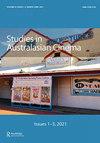A critical introduction to The Nightingale: gender, race and troubled histories on screen
IF 0.7
0 FILM, RADIO, TELEVISION
引用次数: 2
Abstract
ABSTRACT Acclaimed Australian filmmaker Jennifer Kent’s film The Nightingale has generated intense debate since its premiere at the 2018 Venice Film Festival. Set during the Black War in Van Diemen’s Land in 1825, the film is an unflinching depiction of colonial and sexual violence. Kent told The Saturday Paper that she ‘wanted to tell a story that is relevant to my history and my country’. Her vision of British colonisation, and its consequences for those caught in its wake, taps into a conversation with a strong presence in Australia’s public, political and cultural life over the last three decades. This article critically introduces The Nightingale as an historical film; that is, a film set in the past which offers an interpretation of history. We ask: how does The Nightingale represent the past? How might we situate it within longer traditions of historical representation of frontier conflict, and the convict experience? How did audiences respond to the film? And finally, how might we situate The Nightingale in the moment of its reception? What does it mean to make a film about colonial violence at the same moment as the Uluru statement called for truth-telling about our history?《夜莺》的批判性介绍:银幕上的性别、种族和麻烦的历史
澳大利亚著名导演詹妮弗·肯特的电影《夜莺》自2018年威尼斯电影节首映以来就引发了激烈的争论。这部电影以1825年范迪门斯土地上的黑人战争为背景,对殖民和性暴力进行了毫不畏惧的描绘。肯特告诉《周六报》,她“想讲述一个与我的历史和我的国家有关的故事”。她对英国殖民的看法,及其对那些被殖民的人的影响,在过去三十年中,在澳大利亚的公共、政治和文化生活中有着强大的影响力。本文将《夜莺》作为一部历史电影进行了批判性的介绍;也就是说,一部以过去为背景,提供历史解释的电影。我们问:《夜莺》如何代表过去?我们如何将其置于边界冲突和罪犯经历的更悠久的历史传统中呢?观众对这部电影的反应如何?最后,我们该如何把《夜莺》放在它被接受的时刻呢?在《乌鲁鲁宣言》呼吁我们讲述历史真相的同时,制作一部关于殖民暴力的电影,这意味着什么?
本文章由计算机程序翻译,如有差异,请以英文原文为准。
求助全文
约1分钟内获得全文
求助全文

 求助内容:
求助内容: 应助结果提醒方式:
应助结果提醒方式:


